Is India ready for electric vehicles? India’s efforts for this have attracted the attention of the world. The country is at a critical point in its transportation development with the government’s ambitious $3.5 billion manufacturing project and a growing emphasis on emissions reductions. But as the country grapples with issues like the need for a huge network of charging stations, the question is, is India ready for electric vehicles?
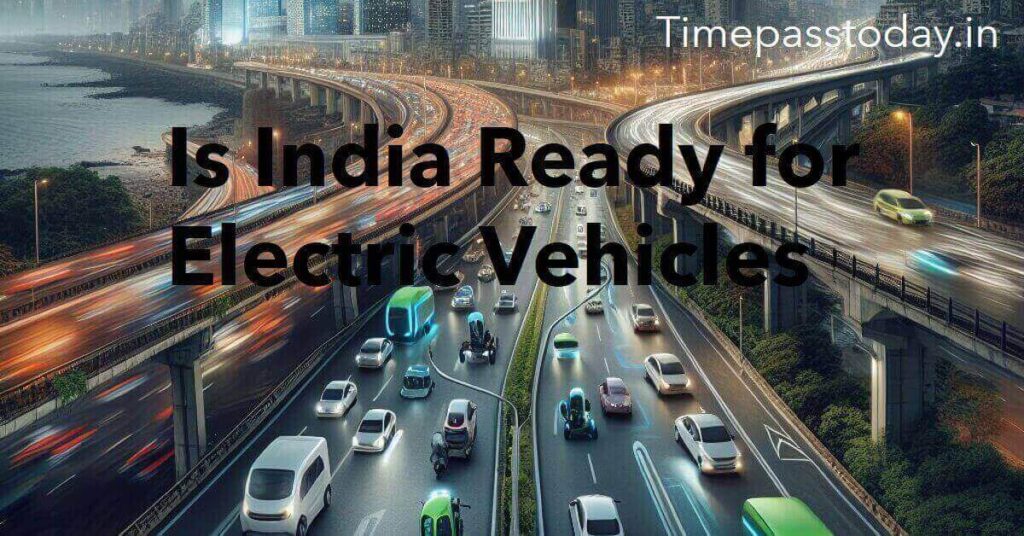
In this article, Is India ready for electric vehicles? You will learn about various aspects of India’s EV readiness including its urgent need, market trends, government initiatives, and the state of the automotive sector today. Evaluating India’s preparedness for the mass market introduction of electric vehicles is becoming increasingly important as the country moves towards a more eco-friendly and sustainable future.
Table of Contents
Is India Ready for Electric Vehicles? A Closer Look at the Challenges and Opportunities
Is India ready for electric vehicles? The (EV) market is about to undergo a paradigm shift that will present both many opportunities and difficulties. As the country struggles to reduce pollution and reliance on traditional fossil fuel vehicles, the potential for electric vehicles (EVs) to completely transform the transportation industry is becoming more apparent.
Despite this, India still has to overcome several hurdles, including customer concerns, high initial costs of EVs, and weak charging infrastructure. Despite these obstacles, the Indian government’s drive to drive EV adoption and the growing need for environmentally friendly transportation have created conditions for an in-depth investigation of the opportunities and difficulties characterizing India’s EV ecosystem.
Opportunities for Electric Vehicles in India
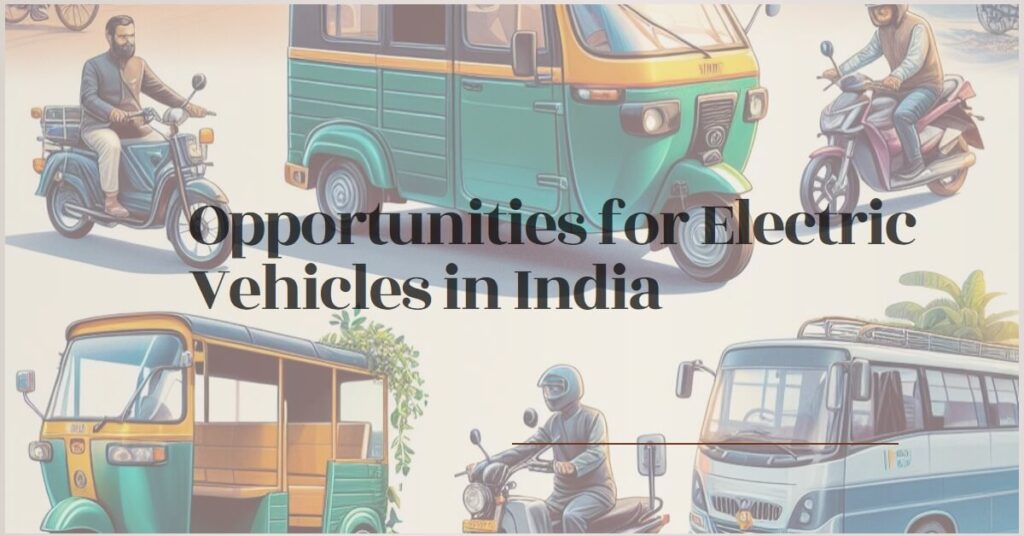
India’s electric vehicles (EV) market is set to undergo a revolution, which will bring with it many opportunities some are as follows:
Global Shift Towards Electric Vehicles (EVs)
The growing popularity of electric cars (EVs) is causing a significant upheaval in the worldwide automotive scene. It is more important than ever to adopt sustainable mobility solutions as the globe struggles with growing oil prices and rising carbon emissions. The increasing popularity of electric vehicles (EVs), driven by factors such as cost competitiveness, increased model availability, and environmental concerns, represents a paradigm change in how we think about transportation.
The Indian Automotive Industry’s Present Situation
As it negotiates the challenges of the twenty-first century, India’s automotive industry a vital sector that contributes 7.1% of the nation’s GDP and 49% of its manufacturing GDP is set to see a dramatic metamorphosis.
In the context of the worldwide trend toward electric cars (EVs) and the growing need for sustainable transportation solutions, India’s automotive industry is poised for a profound transformation. The sector is expected to experience a spike in the adoption of electric vehicles due to factors such as increased investments, government efforts, and a growing demand for electric and autonomous vehicles.
India’s Present Electric Vehicle Industry and Trend
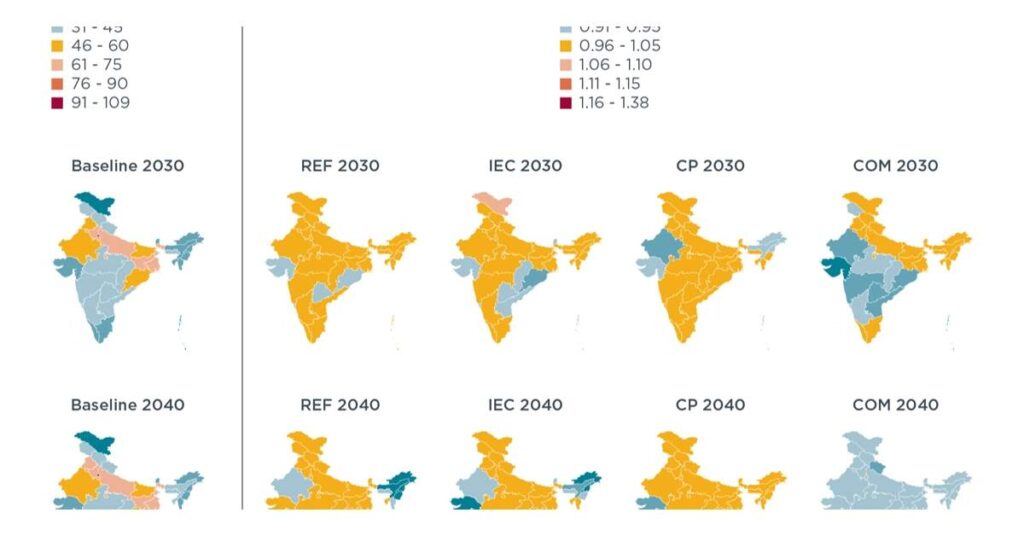
The swift adoption of electric vehicles (EVs) in India has prompted a reassessment of the nation’s transportation requirements in the long run, arousing debates on the possibility of switching from conventional fossil fuel-powered vehicles to a more environmentally friendly substitute. India is leading the world in the electrification trend, and as a result, the country’s EV industry is expanding rapidly. From April to September of 2023, EV sales increased by 112% year over year to 50,284 units.
But in the middle of this growing momentum, there’s a big question: Can India’s infrastructure handle such a significant change in the automobile industry?
Reasons to Evaluate India’s EV Adoption Readiness
The government’s quest for a greener future and the demand for sustainable mobility solutions are driving the adoption of electric vehicles (EVs) in India. Still, it’s unclear if India is prepared for EV adoption on a large scale. Evaluating India’s preparedness for the adoption of electric vehicles (EVs) is essential as the nation sets out on a path toward greater sustainability. Ensuring a favorable regulatory environment requires evaluating how well current rules correspond with the objectives of electric vehicle adoption, assessing technology improvements and research activities, and examining the economic impact.
India’s Need for EVs
India is facing severe environmental and economic problems, making the need for electric vehicles (EVs) more urgent than ever. The need for cleaner and more sustainable mobility options has increased because of the negative effects of conventional gasoline and diesel vehicles on public health and air quality.
India’s EV market is at the forefront of fostering a greener and more sustainable future because of the country’s quick acceptance of EVs, demonstrating its dedication to environmental responsibility and innovation.
Policies and Initiatives of the Government
The Indian government has been actively encouraging the use of electric vehicles (EVs) through many programs and regulations, realizing the financial and environmental advantages of switching to more environmentally friendly modes of transportation.
These government-led initiatives have created new opportunities for investment and innovation in the EV industry, creating a favorable climate for the expansion and advancement of electric vehicles throughout the nation.
India’s Infrastructure for EV Charging
India’s move toward clean energy and sustainable transportation with electric cars (EVs) is audacious and essential. However, the nation’s infrastructure for EV charging is still developing, which presents substantial obstacles to the widespread use of electric vehicles.
India is one of the countries with the lowest EV-to-public-charging ratios, with only 1 charge station for every 135 vehicles.
Even with the quick increase in charging stations from 900 in 2021 to around 11,000 in 2022 the nation still has challenges in building a trustworthy and effective network of charging stations.
Indian Consumer Perception and Awareness of EVs
India’s move toward clean energy and sustainable transportation with electric cars (EVs) is audacious and essential. However, a key factor in the general uptake of EVs is consumer understanding and perception of these cars. The country of India faces difficulties in changing customer attitudes and mindsets regarding EVs, with just 70% of consumers showing a desire to consider an electric automobile.
Obstacles and the Path Ahead
India’s move toward clean energy and sustainable transportation with electric cars (EVs) is audacious and essential. To guarantee widespread acceptance, there are a few obstacles that need to be addressed in the nation’s EV landscape. With only one charging station for every 135 vehicles in India, the lack of charging infrastructure poses a significant challenge to EV adoption. As the Indian EV industry struggles with high costs, consumer misconceptions, and other issues, it is imperative to address these challenges and find creative solutions to propel the EV revolution forward.
India’s EV Penetration
In India, the use of electric cars (EVs) is a critical step toward environmentally responsible and sustainable mobility. Nevertheless, despite notable advancements, India’s EV penetration rate is still just 1.1%, much lower than the 17.3% average for Asia.
This discrepancy highlights the opportunities and difficulties that characterize the nation’s EV environment. Numerous variables impact India’s EV penetration, ranging from low consumer awareness and governmental barriers to expensive upfront expenditures and inadequate charging infrastructure.
Challenges facing electric vehicles in India
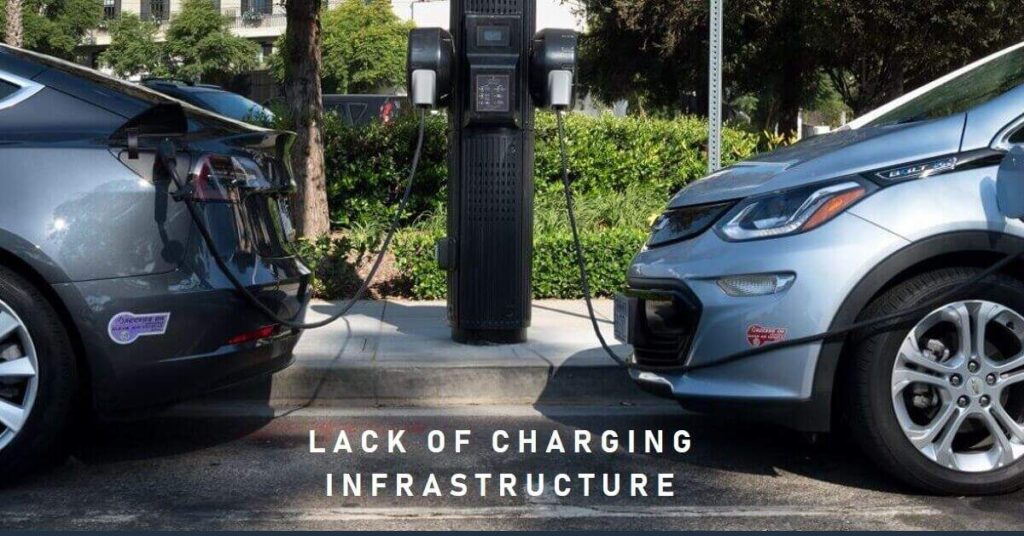
In India, electric vehicles face several hurdles, some of which are listed below:
High cost of electric vehicles
The expensive price of electric cars (EVs) prevents a substantial section of the population from affording them, which is a major obstacle to their widespread adoption in India.
The initial cost of electric vehicles (EVs) is frequently higher than that of conventional internal combustion engine (ICE) vehicles, despite the environmental and financial advantages of EVs.
This cost barrier discourages a lot of prospective purchasers, which restricts the EV market’s expansion and impedes India’s shift to more environmentally friendly modes of transportation.
Lack of Charging Infrastructure
India’s move to electric vehicles (EVs) is an important step towards sustainable transportation, however EV adoption there is severely hampered by a lack of charging infrastructure.
India is one of the countries with the lowest EV-to-public-charging ratios, with only 1 charge station for every 135 vehicles.
Due to a lack of charging facilities, India may fall 40% short of its EV 30@30 goal.
Limited range and battery life
The limited range and battery life of electric vehicles (EVs) pose noteworthy obstacles to their extensive implementation in India. Concerns over range anxiety and the accessibility of charging infrastructure endure despite the rising demand for electric vehicles. The limited range of electric vehicles (EVs) and the requirement for a more extensive charging network are significant factors influencing consumer perception and acceptance, particularly in a nation with large distances like India.
Consumer awareness and perception
India’s move toward clean energy and sustainable transportation with electric cars (EVs) is audacious and essential. However, a key factor in the general uptake of EVs is consumer understanding and perception of these cars. The country of India faces difficulties in changing customer attitudes and mindsets regarding EVs, with just 70% of consumers showing a desire to consider an electric automobile.
Non-availability of parking/charging space
The lack of parking and charging spaces is a major obstacle to India’s adoption of electric vehicles (EVs). One of the biggest challenges facing EV owners as the nation struggles to switch to cleaner transportation is the absence of infrastructure for charging and parking electric cars.
The absence of standards, blackouts, and inadequate infrastructure exacerbate this problem and impede the expansion of the EV charging station market.
Lack of standardization
One major obstacle to the broad adoption of electric vehicles (EVs) in India is the absence of industry standards in the EV sector. For EV owners, finding compatible charging stations is challenging due to the lack of standards and interoperability across various charging networks.
Not only is standardization necessary for charging infrastructure, but it is also necessary for EV batteries, which need a common design and manufacturing process to guarantee cost savings, reduced emissions, and simplicity of adaptation.
Insufficient government support
In India, the use of electric cars (EVs) is a critical step toward environmentally responsible and sustainable mobility. However, to guarantee widespread acceptance, the nation’s EV landscape must overcome some obstacles, including a lack of government assistance.
Notwithstanding the Indian government’s intention to promote EVs through large-scale manufacturing initiatives, obstacles still exist, such as the requirement for reliable charging infrastructure and lower emissions.
Limited investor interest
India’s electric vehicle (EV) market is expected to grow significantly, in 2022, EV startups raised over $1.6 billion, a rise of 117% over the previous year.
Notwithstanding this encouraging trend, the industry continues to face low investor interest, which prevents it from reaching its full potential.
Technical Challenges
To guarantee a smooth and effective transition, India faces many technological obstacles in the process of switching to electric cars (EVs). India’s EV landscape is characterized by several intricate technological challenges, ranging from the high cost of EVs relative to
regular vehicles to the limited range and battery life as well as the requirement for standardized charging infrastructure.
Environmental Concerns
In India, the environmental effects of conventional gasoline and diesel automobiles have drawn increasing attention, as the nation’s sustainable growth is severely hampered by air pollution and climate change.
Using electric cars (EVs) is a viable way to cut carbon emissions and encourage environmentally friendly transportation. The path ahead is not without difficulties, though, as India’s EV environment has many barriers that need to be removed to guarantee widespread adoption.
The benefits of electric vehicles (EVs) in India
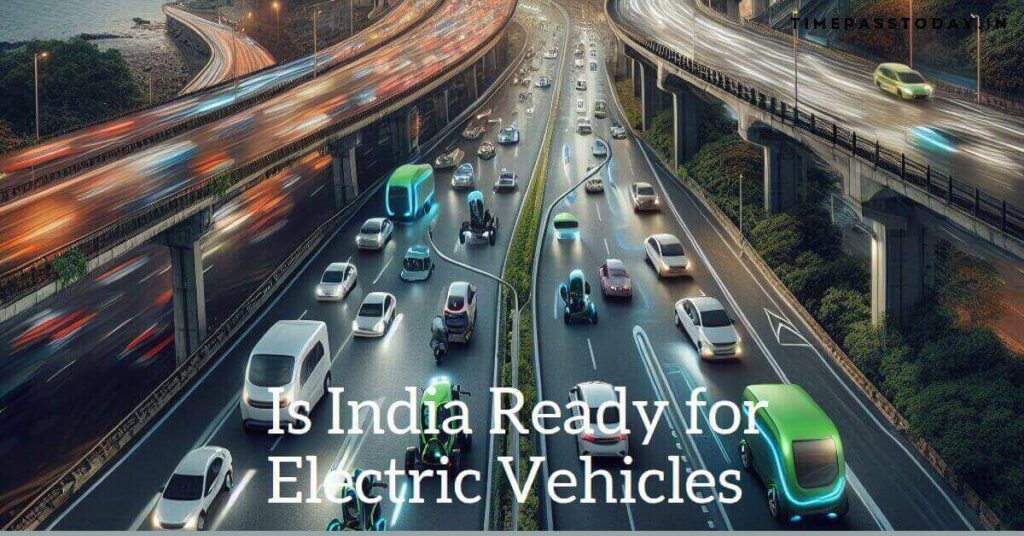
Is India ready for electric vehicles? Its adoption can not only lead to new employment opportunities and benefit the environment, but it can also have many other benefits, which are as follows:
Lower Operating Costs: When compared to conventional internal combustion engine (ICE) vehicles, electric vehicles (EVs) have lower operating costs.
Low Maintenance Costs: Since electric cars typically have fewer moving components, they eventually require less maintenance and repairs.
Financial and Tax Benefits: To encourage the use of electric vehicles, the Indian government offers some financial and tax breaks, including lowered road tax and registration costs.
Better Performance: Because electric motors operate quietly and smoothly, electric vehicles (EVs) are renowned for their remarkable acceleration.
Zero Tailpipe Emissions: By significantly lowering air pollution and greenhouse gas emissions, electric vehicles help the environment.
Convenience of Charging at Home: By simply charging their cars at home, EV users can do away with the need to frequently visit conventional gas stations.
No Fuel, No Emissions: Relying less on non-renewable resources and less on fossil fuels, electric vehicles have a negligible environmental impact.
These benefits highlight how electric cars can completely change India’s transportation system while providing practical, economical, and environmental advantages for both individual users and the country at large.
Read More Also:
FAQ’s
What are the main obstacles to India’s adoption of electric vehicles?
India has many obstacles when it comes to the adoption of electric cars (EVs), such as high prices, a dearth of infrastructure for charging, low customer knowledge, and range anxiety. Compared to conventional cars, EVs are still somewhat pricey, and parking spots and charging stations are scarce, making it challenging for EV owners to recharge their cars.
How is the Indian market for electric vehicles doing right now?
With just 1.3% of all vehicle sales in India coming from electric cars in 2021, the market for these vehicles is still in its infancy. Nonetheless, a substantial compound annual growth rate (CAGR) of 90% is projected for the industry between 2021 and 2030. Through programs like incentives and subsidies, the government has demonstrated support, and by 2030, it is anticipated that the industry will grow to $150 billion.
What steps has the Indian government taken to encourage the use of electric cars?
The Indian government has launched many programs to encourage the use of electric vehicles, such as consumer and automaker incentives and subsidies, as well as research into alternative energy sources for charging. But there are still issues, especially with developing the infrastructure like charging networks which are essential to the mainstream adoption of EVs.
Is the infrastructure of Indian transportation suitable for electric cars?
In terms of getting its transportation system ready for electric vehicles, India still has a ways to go. Establishing sufficient EV charging stations is one of the main areas of concentration, and this can be done through public-private partnerships. Businesses such as TATA Power and Ather Grid are already addressing the issue, but regulations to increase their efficacy are required. The limited availability of parking spots and infrastructure for charging EVs in metropolitan areas further hinders the mainstream adoption of EVs.
What prospects do electric cars have in India going forward?
The future of electric vehicles in India is bright, despite the obstacles. By 2030, the switch to connected, shared, and electric mobility may reduce carbon dioxide emissions by around one gigatonne. The market is predicted to grow rapidly. That being said, increased infrastructure development and ecosystem cooperation are necessary for the successful deployment of electric vehicles.
Summary
At this pivotal point in its transportation history, India is arguing whether or not it ‘is India ready for electric vehicles‘. Despite the government’s obvious intent to encourage EVs through major initiatives, challenges remain, particularly in the construction of infrastructure, such as networks for EV charging. Even with the progress achieved in promoting EV adoption, the expansion of electric mobility has been impeded by the manufacture of batteries, the unreliability of the charging infrastructure, and the limited choice of EV models. Since India is leading the globe in the electrification revolution, resolving these problems and improving the EV ecosystem would be crucial to the quick adoption of electric
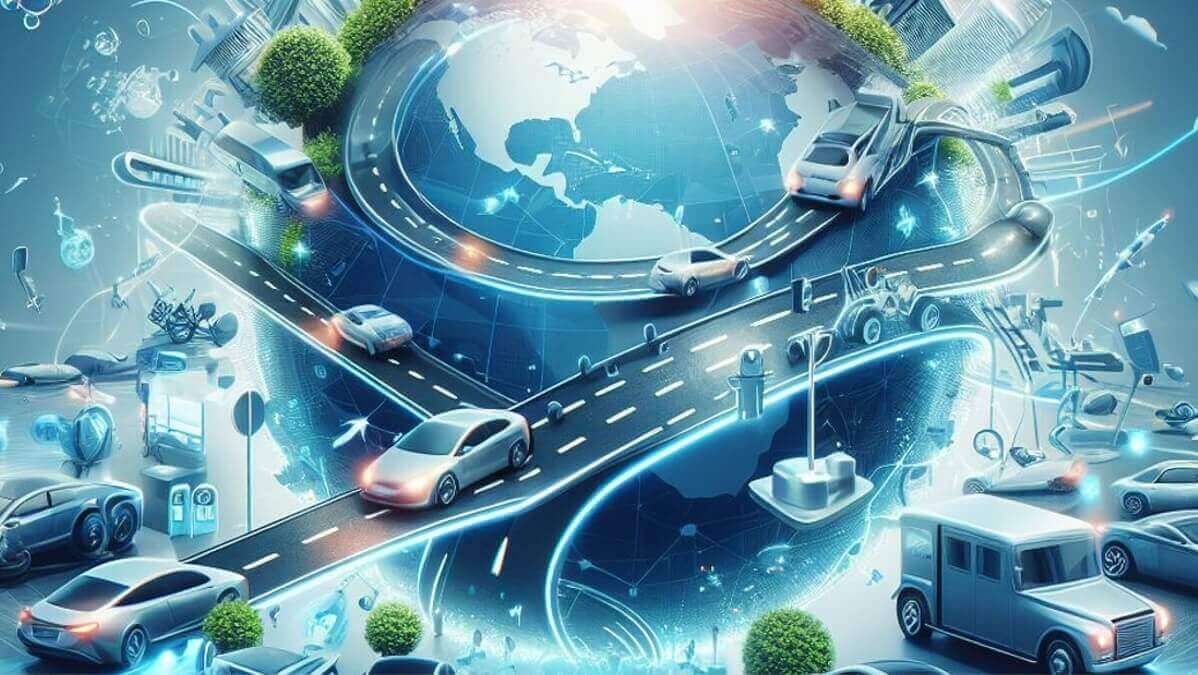
4 thoughts on “Is India Ready for Electric Vehicles? A Closer Look at the Challenges and Opportunities”